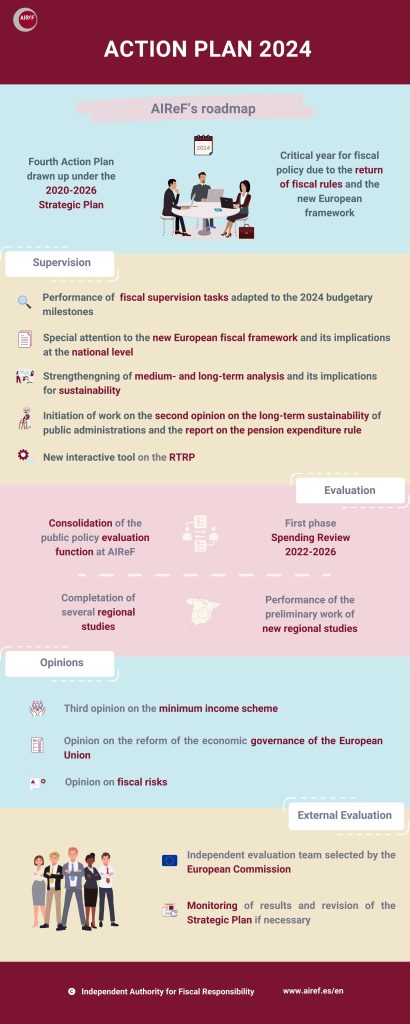- The Independent Authority for Fiscal Responsibility (AIReF) publishes the 2024 Action Plan, the fourth in the 2020-2026 Strategic Plan
- 2024 is set to be a key year for fiscal policy due to the return to fiscal rules and the new European fiscal framework
- AIReF will pay special attention to the new European framework and its transposition to the national level. It will perform its supervisory tasks according to the budgetary milestones, and it will strengthen its medium- and long-term analyses and the consequent implications for sustainability
- It will publish an Opinion on the European Fiscal Governance Reform and another on Fiscal Risks
- It will start work on the second Opinion on the Long-term Sustainability of the General Government and the Report on the Pension Expenditure Rule, which will be published in 2025
- It will publish a new tool on the Recovery, Transformation and Resilience Plan (RTRP)
- AIReF will consolidate its public policy evaluation work, publish the studies of the first phase of the Spending Review 2022-2026, several regional commissions and the third Opinion on the Minimum Income Scheme
- In order to strengthen accountability, AIReF will undergo an external evaluation performed by an independent team appointed by the European Commission
The Independent Authority for Fiscal Responsibility (AIReF) published the 2024 Action Plan on its website today, the fourth to be developed under the 2020-2026 Strategic Plan, published on September 25th, 2020. The new plan is drawn up in a key year for fiscal policy, with the return to fiscal rules after four years of suspension and under a new framework of rules at a European level that will need to be transposed to the national framework.
In this new context, Member States will have to present, for the first time, their medium-term fiscal-structural plans, which, in countries with high public debt, will anchor the fiscal strategy for four years with the aim of reducing the debt towards the levels of the Treaty on European Union.
AIReF, whose mandate is to oversee the sustainability of public accounts, will perform the necessary fiscal supervision tasks, adapting its publication schedule to the budgetary milestones for 2024 and the requirements of the fiscal framework in force. It will pay particular attention to the implications of the new European fiscal framework at the national level and will strengthen its work on analysing and disseminating the reform of the European fiscal framework and, as the case may be, the national fiscal framework. In this regard, AIReF will prepare an Opinion on the Reform of the Economic Governance of the European Union, which affects the regulations making up the Stability and Growth Pact, as well as the National Fiscal Frameworks Directive. In this Opinion, AIReF will analyse the new fiscal framework from the point of view of the sustainability of public finances and will provide some aspects for the transposition of the Directive.
In line with the requirements of the new European fiscal governance, AIReF will strengthen its medium- and long-term analyses and their implications for the sustainability of public finances. In 2024, it will start work on the second Opinion on the Long-term Sustainability of the General Government and the Report on the Pension Expenditure Rule, which will be published in 2025.
The institution will also prepare an Opinion on Fiscal Risks, understood as factors that cause fiscal results to deviate from those expected. In the Opinion on Fiscal Transparency in the General Government in Spain, AIReF identified shortcomings in the analysis and management of fiscal risks in Spain. This new opinion will analyse macroeconomic risks and environmental risks.
In addition, AIReF will assess the macroeconomic impact of the measures and reforms included in the Recovery, Transformation and Resilience Plan and will develop an interactive tool on their degree of execution.
CONSOLIDATING EVALUATION
In the field of evaluation, 2024 will also be critical for consolidating the public policy evaluation function at AIReF. This comes after several years of implementation that now means that the evaluation function needs to be provided with the same guarantees as the fiscal supervision function.
AIReF will undertake the two studies commissioned under the first phase of the new Spending Review 2022-2026: a study on financial instruments to support the productive sectors, in particular those relating to digitalisation and innovation, and a study on the healthcare of the social security system for civil servants. It will also complete several regional commissions, such as studies on human resources in healthcare in the Balearic Islands, Extremadura and Navarre, the study on universities in Castile and Leon and the study on health equipment and infrastructure in Navarre. It will also publish the third Opinion on the Minimum Income Scheme.
At an internal level, in 2024 AIReF will undergo an external evaluation launched at its own initiative as one of the objectives of the 2020-2026 Strategic Plan. This evaluation will be carried out by an independent evaluation team selected by the European Commission within the framework of technical assistance funded through the DG REFORM Technical Support Instrument. AIReF has undertaken to apply the “comply or explain” principle to any recommendations that it may receive, and to revise the Strategic Plan if deemed necessary.






